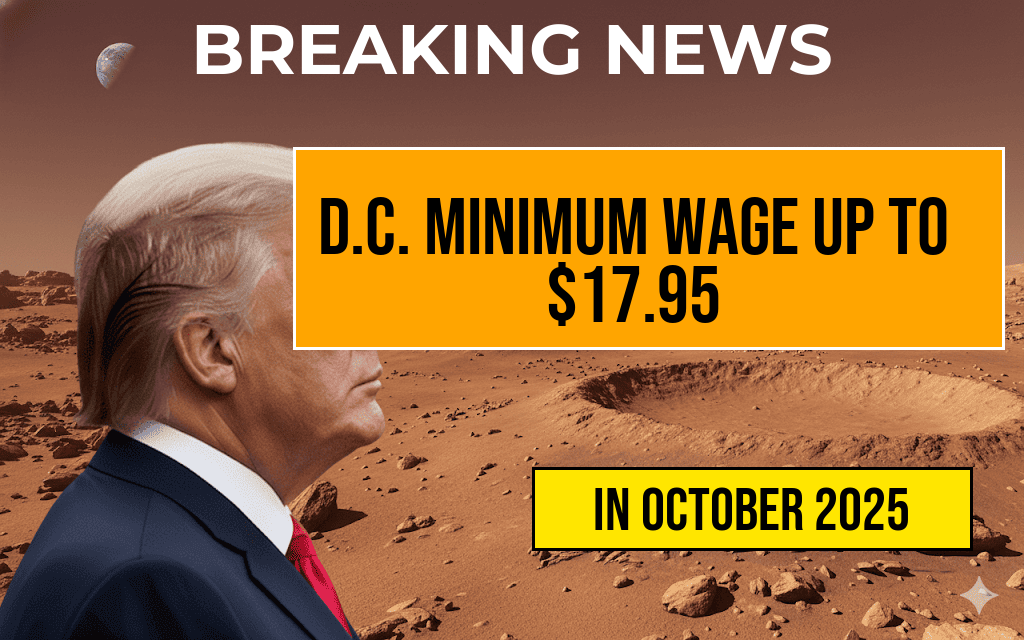District of Columbia Raises Minimum Wage to $17.95, Boosting Earnings for Thousands
The District of Columbia has announced an increase in its minimum wage, bringing the hourly rate to $17.95. Effective immediately, this adjustment results in an additional $0.45 per hour for affected workers, translating to an annual increase of approximately $936 based on a standard 40-hour workweek. The change marks a continued effort by local policymakers to improve living standards amid rising living costs and economic pressures. With over 90,000 workers earning at or near the minimum wage, the increase aims to provide meaningful financial relief, particularly for service industry employees and entry-level workers. This move aligns with broader trends across the U.S., where many cities and states are revising wage standards to address economic disparities and inflation concerns.
Background on D.C.’s Minimum Wage Policy
The District of Columbia has maintained a progressive stance on wage legislation, regularly adjusting the minimum wage to reflect inflation and cost of living trends. The current raise follows a series of incremental increases implemented over the past few years, with the city’s wage reaching $17.50 just last year. The latest adjustment was approved by the D.C. Council after consultations with labor advocates and economic experts, emphasizing the importance of sustaining economic growth while ensuring fair pay.
According to the Wikipedia entry on minimum wages in the U.S., local jurisdictions often set their own wage standards, which can be higher than federal minimums. D.C.’s approach reflects a broader trend among urban centers aiming to combat income inequality and enhance workforce stability.
Impacts of the Wage Increase
The $0.45 hourly increase affects a broad demographic of low-income earners, including retail workers, hospitality staff, and administrative aides. For full-time employees, this translates into an additional $936 annually—an amount that can cover basic expenses such as groceries, transportation, or utilities for some families.
| Hours Worked per Week | Annual Increase |
|---|---|
| 40 hours | $936 |
| 30 hours | $702 |
| 20 hours | $468 |
Labor advocates argue that even modest wage hikes can have ripple effects, boosting local economies by increasing purchasing power. Conversely, some business owners express concerns about rising labor costs, citing potential impacts on employment levels and prices.
Broader Economic Context
The increase in D.C.’s minimum wage is part of a larger national pattern of wage adjustments driven by inflation, legislative initiatives, and city-specific policies. According to Forbes, several states and municipalities have implemented minimum wage increases in 2023, with some cities surpassing $20 per hour.
The federal minimum wage remains at $7.25, but local laws like D.C.’s establish higher standards to better align wages with living expenses. The city’s approach reflects a recognition that wages must keep pace with economic realities to prevent widening income gaps and support workforce retention.
Potential Challenges and Considerations
While the wage increase is welcomed by many workers, it also prompts discussions on possible unintended consequences. Small businesses, especially in sectors with tight profit margins, may face increased operational costs. Economic analyst Dr. Lisa Grant from the Urban Policy Institute notes, “Adjustments like this are vital for supporting workers, but they require complementary policies such as tax relief or targeted assistance to mitigate potential negative effects on employment or business sustainability.”
Additionally, some critics argue that incremental raises may not be sufficient to address the full scope of financial hardships faced by low-income residents. Advocates emphasize the need for comprehensive strategies that include housing affordability, healthcare access, and workforce development.
Looking Ahead
The D.C. government has signaled ongoing commitment to wage growth, with plans for future increases tied to inflation metrics and economic conditions. Workers and employers alike are encouraged to stay informed through official channels, including the District of Columbia Department of Labor, which provides updates on wage laws and employment resources.
As the minimum wage continues to evolve in the nation’s capital, the focus remains on balancing economic vitality with fair compensation, aiming to foster a more equitable and resilient local economy.
Sources:
- Wikipedia – Minimum Wage in the U.S.
- Forbes – U.S. Minimum Wage Trends 2023
- District of Columbia Department of Labor
Frequently Asked Questions
What is the new minimum wage in D.C.?
The minimum wage in D.C. has increased to $17.95 per hour.
How much will the wage increase per hour and annually?
The wage rise is $0.45 per hour, which amounts to an annual increase of approximately $936.
When did the minimum wage increase take effect?
The new minimum wage in D.C. started on [Insert Effective Date].
Who is affected by the wage increase?
The minimum wage increase impacts workers earning hourly wages in D.C., including those in various industries such as retail, hospitality, and service sectors.
Are there any future plans to adjust the minimum wage?
Yes, the minimum wage in D.C. is subject to periodic adjustments based on legislation or inflation measures to ensure fair earnings for workers.

Leave a Reply